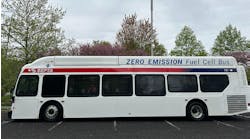The board of trustees for the Central Ohio Transit Authority (COTA) unanimously approved making the COTA Income Assistance Program a permanent benefit for qualifying customers and authorized updates to the authority’s five-year capital improvement program to upgrade the physical infrastructure needed to support a zero-emission, carbon-neutral future.
COTA Income Assistance Program
The Income Assistance Pilot Program launched in March to extend eligibility for transit discounts to individuals who receive public income assistance. The board also approved including the Special Supplemental Nutrition Program for Women, Infants and Children (WIC) as one of the qualifying programs to receive the COTA discount.
The COTA Income Assistance Program provides a 50 percent discount for customers who participate in one of the following seven countywide programs:
- SNAP food assistance
- Publicly funded childcare
- Ohio Works First cash assistance
- Prevention, Retention and Contingency emergency assistance
- Medicaid
- Temporary Assistance to Needy Families (TANF)
- WIC
Eligible customers can apply for the discounted fares at COTA’s Customer Experience Center in downtown Columbus. Customers need to show verification from a qualifying agency that displays their name and verifies they receive assistance from one of the countywide programs. COTA Customer Experience Champions will be available to review documentation and verify eligibility for enrollment.
Those who qualify for the Income Assistance Program receive their discount through COTA’s new account-based digital payment system. The new account-based ticketing system launched in November 2021 utilizes the Transit app or COTA Smartcards. It allows customers to benefit from new fare capping technology that keeps track of their trips, so customers paying standard fares will not pay more than $4.50 per day or $62 per month. Customers receiving Income Assistance will have their fares capped at $2.25 per day and $31 per month.
Capital Improvement Program
The COTA Board of Trustees also approved updates to the authority’s five-year, $381.8 million Capital Improvement Program (CIP 2023 - 2027), which outlines upgrades to COTA’s vehicles, infrastructure and facilities to improve regional transit.
“The Capital Improvement Program turns our focus from primarily large facility upgrades to the physical infrastructure needed to support a zero-emission, net carbon neutral future for mobility in our region,” said COTA Chief Engineering and Mechanical Officer Andy Biesterveld. “This investment shows COTA’s commitment to providing equitable and accessible transit that also improves the quality of life for our customers and our community.”
Key priorities in the FY 2023-2027 CIP include:
- Zero-emission vehicles: COTA will now purchase only zero-emission vehicles for fixed-route services. The CIP includes 14 new electric coaches in 2023, another 14 in 2024 and 28 per year beginning in 2025. The CIP also provides funding for two hydrogen-powered coaches in 2027.
- Electrification systems: CIP funding includes purchases for depot and on-route charging equipment, safety equipment for servicing electric vehicles, and charging and monitoring systems for revenue and non-revenue vehicles.
- Facility improvements: The CIP will fund construction of the Rickenbacker Mobility Center, upgrades of Linden Transit Center and Essex facility, pavement maintenance and additional transit shelters.
- Technology: Projects include installing new Automated Personnel Counters to improve ridership data and purchasing digital transit stop signs to better display when the next transit vehicle will arrive.
- Development and infrastructure: Funding for improvements to transit stops, property acquisition and improvements, as well as demonstrations and pilot projects focused on dedicated vehicle lanes.
The CIP is updated by COTA and reviewed by the board of trustees annually. It is reviewed separately from COTA’s annual operating budget, which the board approves each December.


